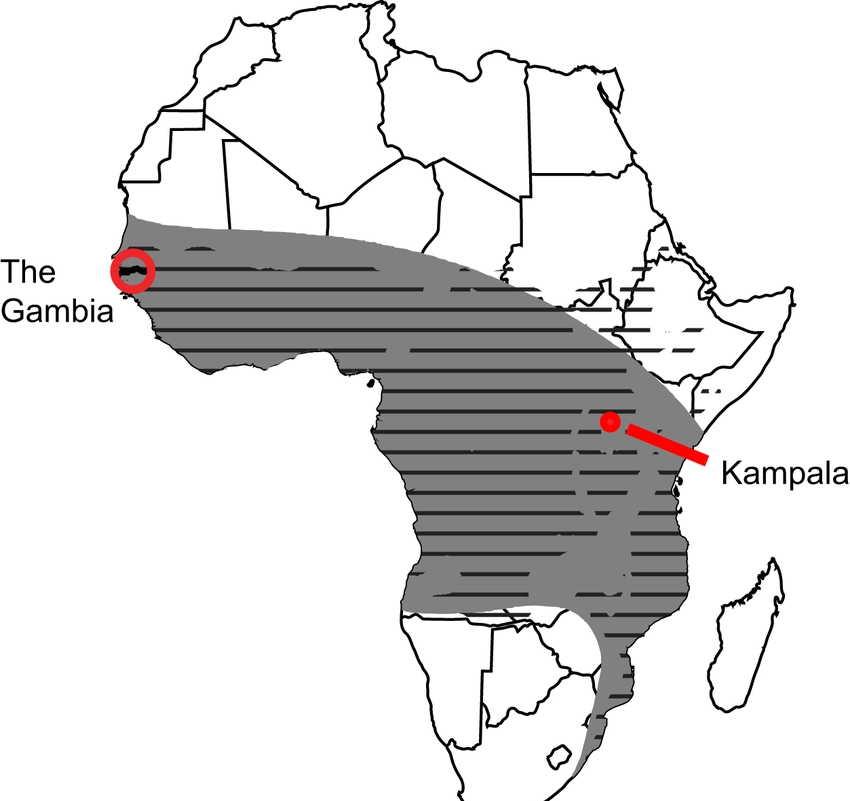What is Burkitt Lymphoma?
Burkitt lymphoma is a rare and aggressive form of non-Hodgkin lymphoma (NHL), a type of cancer that affects the immune system. It is characterized by the rapid growth of abnormal white blood cells called lymphoma cells. These cells multiply uncontrollably, forming tumors in the lymph nodes, bone marrow, or other lymphoid tissues.
Table of Contents
- What is Burkitt Lymphoma?
- The Lymphoma Belt: Distribution of Burkitt Lymphoma in Africa
- Causes and Risk Factors for Burkitt Lymphoma
- Signs and Symptoms of Burkitt Lymphoma
- Diagnosis of Burkitt Lymphoma
- Management and Treatment of Burkitt Lymphoma
- Prognosis
- Wrap-up: Importance of early and accurate diagnosis of Burkitt lymphoma
- Sharing is Caring
- Author
The Lymphoma Belt: Distribution of Burkitt Lymphoma in Africa

Named after Dr Denis Parsons Burkitt working in Uganda, BL is a common childhood cancer. Its has been shown to occur in an area across the central parts of Africa, hence the Lymphoma Belt.
In Kenya, about 800 cases are diagnosed each year
Causes and Risk Factors for Burkitt Lymphoma
The exact cause of Burkitt lymphoma is not fully understood, but several factors are known to increase the risk of developing the disease:
1. Infection with the Epstein-Barr virus (EBV):
EBV is a common virus that causes infectious mononucleosis. It is found in many cases of Burkitt lymphoma, particularly in endemic Burkitt lymphoma, which is common in equatorial Africa.
2. Genetic mutations:
Certain genetic mutations, such as those that affect the MYC gene, can increase the risk of developing Burkitt lymphoma.
3. Weakened immune system:
People with weakened immune systems, such as those with HIV/AIDS or taking immunosuppressive drugs, are more susceptible to developing Burkitt lymphoma.
4. Age:
Burkitt lymphoma can occur at any age, but it is more common in children and young adults. In Kenya, it is commonly seen in children below 10 years
Signs and Symptoms of Burkitt Lymphoma
The symptoms of Burkitt lymphoma vary depending on the location and size of the tumor. Common symptoms include:
- Swollen lymph nodes: Enlarged lymph nodes in the neck, armpits, or groin area.
- Fever: Recurring or persistent fever.
- Fatigue: Feeling weak or tired.
- Weight loss: Unexplained weight loss.
- Abdominal pain: Pain or swelling in the abdomen due to tumor growth.
- Night sweats: Recurring night sweats.
Common presentation of Burkitt Lymphoma- Rapidly enlarging jaw swelling

Diagnosis of Burkitt Lymphoma
Diagnosing Burkitt lymphoma typically involves a combination of the following tests:
👩⚕️Physical examination:
A doctor will perform a physical examination to check for swollen lymph nodes or other signs of the disease.
☢Imaging tests: Imaging tests such as CT scans, MRI scans, or PET scans are used to determine the location and size of tumors.
🏥Biopsy: A biopsy involves removing a sample of tissue from a suspicious swelling, lymph node or other affected area for examination under a microscope. A bone marrow
🩸Blood tests: Blood tests are used to check for abnormal white blood cell counts and to evaluate organ function.
Management and Treatment of Burkitt Lymphoma
Treatment for Burkitt lymphoma in Kenya usually involves a combination of chemotherapy, immunotherapy, and in some cases, stem cell transplantation. The goal of treatment is to quickly reduce the number of cancer cells and prevent the disease from progressing.
- Chemotherapy: Chemotherapy is the primary treatment for Burkitt lymphoma. It involves using drugs to kill cancer cells.
- Immunotherapy: Immunotherapy is used to help the immune system fight cancer cells. It may be used in combination with chemotherapy.
- Stem cell transplantation: In some cases, stem cell transplantation may be necessary to replace damaged bone marrow with healthy stem cells.
Prognosis
The prognosis for Burkitt lymphoma varies depending on the stage and aggressiveness of the disease. With prompt and aggressive treatment, the prognosis is generally good, especially for children and young adults. However, the disease can be fatal if left untreated or if it recurs after treatment.
Wrap-up: Importance of early and accurate diagnosis of Burkitt lymphoma
Burkitt lymphoma is a rare and aggressive form of non-Hodgkin lymphoma that requires prompt and aggressive treatment. Understanding the causes, symptoms, diagnosis, and treatment options is crucial for effective management of the disease. If you or a loved one has been diagnosed with Burkitt lymphoma, it is essential to work closely with a healthcare team to develop a personalized treatment plan.
Disclaimer
The information provided on this medical blog is for general informational purposes only and should not be considered as a substitute for professional medical advice. Always consult with a qualified healthcare provider before making any healthcare decisions or taking any actions based on the information provided on this blog. The authors and publishers of this blog are not liable for any errors or omissions in the content or for any actions taken based on the information provided.

